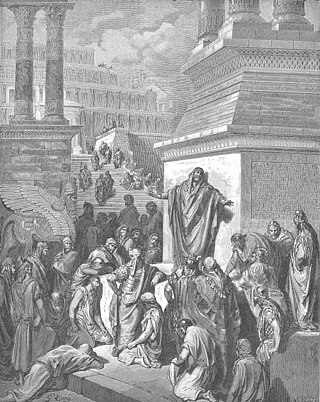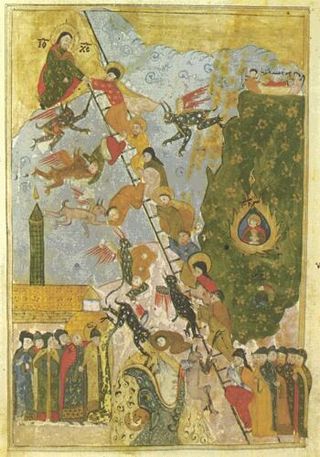Related Research Articles

Matthew 4:17 is the seventeenth verse of the fourth chapter of the Gospel of Matthew in the New Testament of the Christian Bible. In the previous verses Jesus returned to Galilee after hearing of the arrest of John the Baptist and then left Nazareth for Capernaum. This verse reports that once in Capernaum, Jesus began to preach.

Matthew 5:20 is the twentieth verse of the fifth chapter of the Gospel of Matthew in the New Testament and is part of the Sermon on the Mount. Jesus has reported that he came not to destroy the law, but fulfill it. But in this verse, he makes clear that the common understanding of the Law is not enough.

Matthew 12:39 is the 39th verse in the twelfth chapter of the Gospel of Matthew in the New Testament.
Matthew 12:38 is the 38th verse in the twelfth chapter of the Gospel of Matthew in the New Testament.

Matthew 9:9 is the ninth verse in the ninth chapter of the Gospel of Matthew in the New Testament.
Matthew 11:9 is the ninth verse in the eleventh chapter of the Gospel of Matthew in the New Testament.
Whoever welcomes a prophet as a prophet will receive a prophet’s reward, and whoever welcomes a righteous person as a righteous person will receive a righteous person’s reward.
Matthew 10:42 is a verse in the tenth chapter of the Gospel of Matthew in the New Testament.

Matthew 8:10 is the tenth verse of the eighth chapter of the Gospel of Matthew in the New Testament. This verse continues the miracle story of healing the centurion's servant, the second of a series of miracles in Matthew.
Matthew 11:19 is the nineteenth verse in the eleventh chapter of the Gospel of Matthew in the New Testament.
Matthew 11:24 is the 24th verse in the eleventh chapter of the Gospel of Matthew in the New Testament.

Matthew 8:22 is the 22nd verse in the eighth chapter of the Gospel of Matthew in the New Testament of the Christian Bible.
Matthew 11:25 is the 25th verse in the eleventh chapter of the Gospel of Matthew in the New Testament.

Matthew 12:6 is the sixth verse in the twelfth chapter of the Gospel of Matthew in the New Testament.

Matthew 10:15 is the fifteenth verse in the ninth chapter of the Gospel of Matthew in the New Testament.

Matthew 12:41 is the 41st verse in the twelfth chapter of the Gospel of Matthew in the New Testament.
John 1:21 is a verse in the first chapter of the Gospel of John in the New Testament.

John 1:51 is the 51st verse in the first chapter of the Gospel of John in the New Testament.

Matthew 11:2-3 are the second and third verses in the eleventh chapter of the Gospel of Matthew in the New Testament.
Matthew 11:4-6 is a set of verses in the eleventh chapter of the Gospel of Matthew in the New Testament.
References
- ↑ Cornelius Cornelii a Lapide; Thomas Wimberly Mossman The great commentary of Cornelius à Lapide, London: J. Hodges, 1889-1896.
- ↑ John MacEvilly, An Exposition of the Gospel of St. John consisting of an analysis of each chapter and of a Commentary critical, exegetical, doctrinal and moral, Dublin Gill & Son 1879.
- 1 2 3 4 5 6 7 8 "Catena aurea: commentary on the four Gospels, collected out of the works of the Fathers: Volume 6, St. John. Oxford: Parker, 1874. Thomas Aquinas". 1874.
 This article incorporates text from this source, which is in the public domain .
This article incorporates text from this source, which is in the public domain .